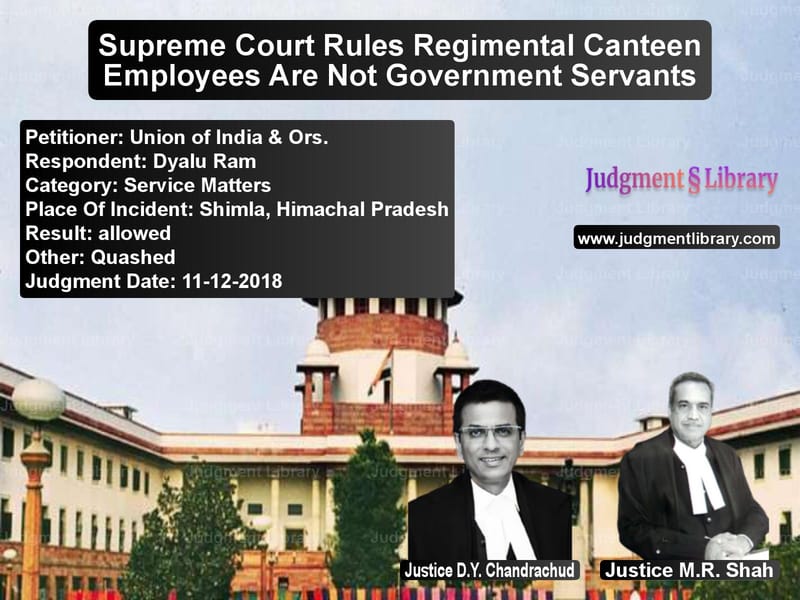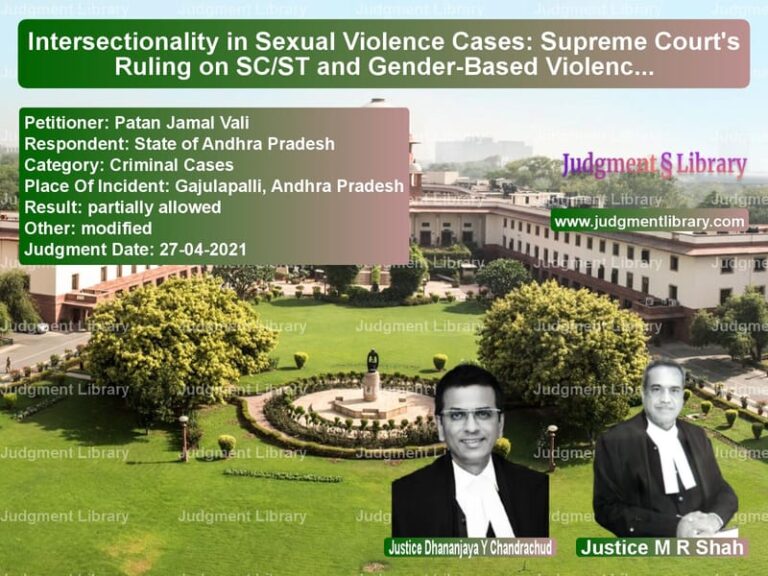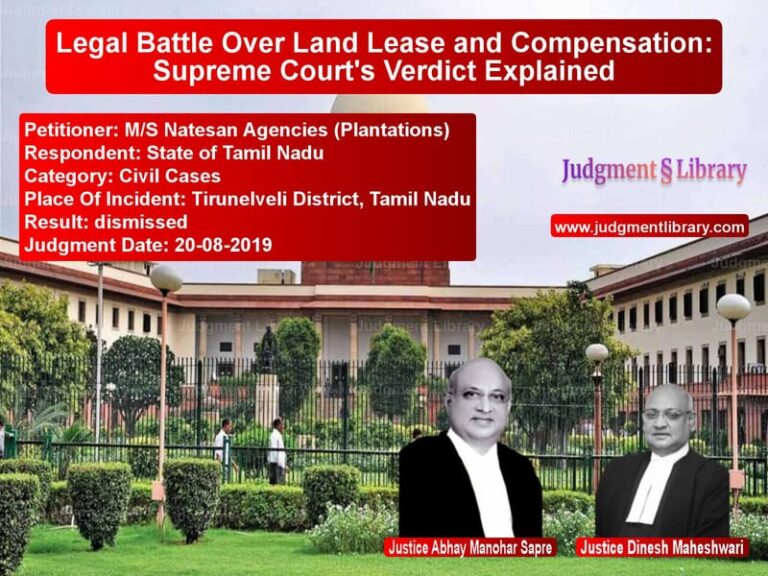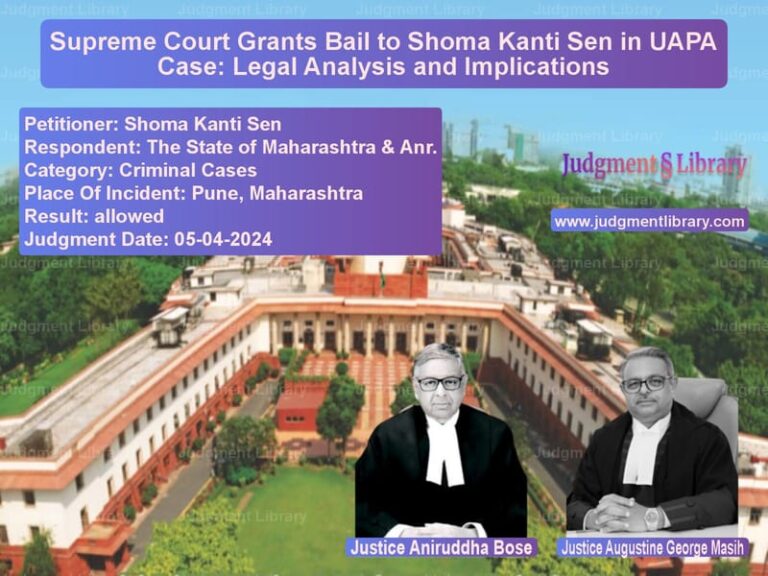Supreme Court Rules Regimental Canteen Employees Are Not Government Servants
The case of Union of India & Ors. vs. Dyalu Ram revolved around the status of employees working in regimental canteens of the Indian Army. The Supreme Court, in its judgment dated December 11, 2018, ruled that such employees are not government servants and are not entitled to claim regularization as civil employees of the Union of India.
The Court set aside the orders of the Central Administrative Tribunal and the Himachal Pradesh High Court, which had directed the reinstatement of the respondents as civil cooks. The ruling clarified that regimental funds are not part of the Consolidated Fund of India and that employees paid from these funds do not hold a civil post under the government.
Background of the Case
The respondents, Dyalu Ram and others, were engaged as casual cooks in the Headquarters of the Army Training Command (ARTRAC), Shimla, in 1993 and 1994. Their wages were paid out of Regimental Funds. In 2003, their services were terminated, prompting them to file a case before the Central Administrative Tribunal (CAT), Chandigarh.
The Tribunal ruled in favor of the respondents, directing their reinstatement without back wages. The Union of India appealed against this order before the Himachal Pradesh High Court, which dismissed the appeal, upholding the Tribunal’s ruling. The matter then reached the Supreme Court.
Legal Issues Considered
The Supreme Court analyzed the following key issues:
- Whether employees of regimental canteens are government servants.
- Whether regimental funds are part of the Consolidated Fund of India.
- Whether the Tribunal had jurisdiction to entertain the matter under Section 14 of the Administrative Tribunals Act, 1985.
- Whether the respondents had a legal right to claim regularization.
Arguments by the Appellants
The Union of India, represented by Senior Counsel, argued:
- Regimental funds are private funds and do not form part of the Consolidated Fund of India.
- The respondents were not appointed to a civil post under the Union of India.
- As per the Supreme Court’s ruling in R.R. Pillai (D) Thr. LRs. vs. Commanding Officer, Southern Air Command and Union of India vs. Gobinda Prasad Mula, employees of regimental canteens are not government servants.
- The Tribunal had no jurisdiction to entertain the case under the Administrative Tribunals Act, 1985.
Arguments by the Respondents
The respondents, represented by Advocate Ashok Agarwal, countered:
- They had been working continuously since 1993 and were arbitrarily terminated in 2003.
- They were wrongly classified as casual workers despite rendering long years of service.
- The Army authorities exercised administrative control over their employment, making them government employees.
- They were entitled to the benefits of regularization under the Office Memorandum dated March 26, 2012, issued by the Ministry of Defence.
Supreme Court’s Judgment
The Supreme Court, comprising Justices D.Y. Chandrachud and M.R. Shah, ruled in favor of the Union of India, holding that regimental canteen employees are not government servants. The key observations included:
- “The position of Unit-run Canteens of the Indian Army is no longer res integra following the decision of this Court in R.R. Pillai.”
- “Employees of regimental canteens are neither government servants nor do they hold a civil post under the Union.”
- “Regimental Funds are not drawn from the Consolidated Fund of India but are private in nature.”
- “The Tribunal had no jurisdiction to entertain the claim under Section 14 of the Administrative Tribunals Act, 1985.”
Key Takeaways from the Judgment
- Regimental Canteen Employees Are Not Government Servants: The ruling confirms that employees paid from regimental funds do not hold civil posts under the Union of India.
- Administrative Tribunal Lacks Jurisdiction: Employees of regimental canteens cannot seek relief under the Administrative Tribunals Act, 1985.
- Private Nature of Regimental Funds: The Court reaffirmed that regimental funds are not part of the Consolidated Fund of India.
- No Right to Regularization: Since the respondents were not employed by a government department, they had no legal claim for regularization.
Final Directions
The Supreme Court ruled:
- The orders of the Tribunal and the High Court were set aside.
- The respondents’ claims for reinstatement and regularization were dismissed.
- The continuance of the respondents’ employment would be at the discretion of the regimental canteen authorities.
- A sympathetic view may be taken in considering their continued employment.
Conclusion
This judgment clarifies the status of regimental canteen employees in the Indian Army, reinforcing that they are not government servants and cannot claim regularization. It also establishes the principle that private funds do not confer government employment status.
The decision serves as a significant precedent in employment law, ensuring that recruitment policies are applied uniformly and that judicial review does not extend to matters outside the jurisdiction of tribunals.
Petitioner Name: Union of India & Ors..Respondent Name: Dyalu Ram.Judgment By: Justice D.Y. Chandrachud, Justice M.R. Shah.Place Of Incident: Shimla, Himachal Pradesh.Judgment Date: 11-12-2018.
Don’t miss out on the full details! Download the complete judgment in PDF format below and gain valuable insights instantly!
Download Judgment: Union of India & Ors vs Dyalu Ram Supreme Court of India Judgment Dated 11-12-2018.pdf
Direct Downlaod Judgment: Direct downlaod this Judgment
See all petitions in Employment Disputes
See all petitions in Public Sector Employees
See all petitions in Recruitment Policies
See all petitions in Judgment by Dhananjaya Y Chandrachud
See all petitions in Judgment by Mukeshkumar Rasikbhai Shah
See all petitions in allowed
See all petitions in Quashed
See all petitions in supreme court of India judgments December 2018
See all petitions in 2018 judgments
See all posts in Service Matters Category
See all allowed petitions in Service Matters Category
See all Dismissed petitions in Service Matters Category
See all partially allowed petitions in Service Matters Category







